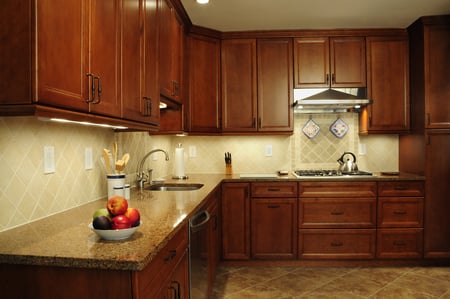Baby Steps! How to Remodel Your Kitchen in Stages


Are you dreaming of a fully remodeled kitchen? While it's great to have lofty goals, you might want to consider breaking down your project into a few smaller stages. After all, the average kitchen remodel takes anywhere from 6 to 12 weeks.
When you start thinking about living with a kitchen that's in a state of disarray for up to three months, it's easy to see why this might not be the best idea after all.
There's also the expense to consider. The average cost of a full kitchen remodel ranges from $12,000 to $21,000 and could be significantly higher. Unless you have a large chunk of cash set aside, a staged remodel is much easier on your finances.
Here's a quick primer to help you understand exactly what "remodeling in stages" means and how you can apply it to your kitchen renovation project:
1. Design Phase
While you'll be tackling your project in phases, it's critical to have solid plan for what the entire space will look like when it's done. That's why it's important to spend some time designing your new kitchen before you start the actual remodel. Depending on the complexity of your project, this could range from a hand-drawn illustration and some notes to a full blueprint created by a contractor.
2. Planning and Budgeting
Once you have a clear idea of what you want, it's time to figure out how much it's going to cost. Spend some time to make sure you’ve thoroughly and accurately calculated the costs, then add another 10% for unforeseen expenses. You'll also want to determine how long each phase is expected to take and whether you'll be able to use your kitchen while it's being done.
3. Upper Cabinets
Phased kitchen remodels often start with replacing or updating the upper cabinets. You should be able to paint, resurface or replace these cabinets within a few days to a week and it shouldn't interrupt your ability to use the kitchen.
4. Lower Cabinets and Countertops
Next comes your lower cabinets and countertops. Depending on what you have planned, this could take some time and may render your kitchen unusable for at least a few days. If your remodel requires you to replace your sink and faucet, that should be done during this phase as well.
5. Appliances
If you're replacing your appliances, you'll need to choose them before you start the remodel. This will allow for the precise measurements that are necessary for a well-designed kitchen, as well as ensure you stay within your budget. Your cabinets and countertops will also need to be spaced out perfectly to accommodate these appliances. Once this phase of the remodel is done, you'll be able to access and use them with ease.
6. Flooring
Updating your flooring shouldn't take more than a few days unless you have a very large kitchen or are planning a major change. Depending on how detailed your update is, you may decide to do the flooring before replacing your lower cabinets.
7. Finishing Touches
Once all of the other phases are completed, you can turn your attention to important details like lighting, backsplashes and window shades. You'll be able to relax and take your time, knowing that the bulk of the hard work is already done.
Now that you know exactly how to get started with your kitchen remodel, it's time for the fun part! Check out these articles for some kitchen design inspiration:

